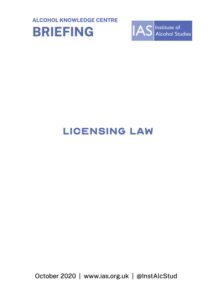View this report

Summary
- Licensing laws control where, when and to whom alcohol can be sold or supplied
- Premises are licensed for the sale or supply of alcohol, with additional personal licences authorising the holders to sell or supply alcohol for consumption on or off premises
- There are four licence objectives in England and Wales. Scotland has a fifth, public health
Introduction
Licensing laws control where, when and to whom alcohol can be sold or supplied. Licensing is governed by the Licensing Act 2003 in England and Wales, and by the Licensing (Scotland) Act 2005 in Scotland.
In England and Wales, the Licensing Act 2003 amalgamated six previous licensing regimes into a single integrated scheme (alcohol, public entertainment, cinemas, theatres, late night refreshment houses and night cafes). In Scotland, the Licensing Act 2005 regulates solely the sale and supply of alcohol.
However, while the basic principles and provisions of both Acts are broadly similar (for example, on both sides of the border alcohol licensing is the responsibility of local authorities) there are some key differences.
Licensing principles, provisions, and objectives
Basic principles and provisions
- A special licence is required to sell or supply alcoholic drink above 0.5% strength alcohol by volume [ABV]
- Premises are licensed for the sale or supply of alcohol. In addition, there is a system of personal licences, authorising the holders to sell or supply alcohol for consumption on or off premises for which a premises licence has been granted
- Personal licences are granted to those aged 18 years of age and over following a test of knowledge of licensing law and social responsibilities, and subject to police scrutiny if relevant offences have been committed
- Each application for a premises licence must be considered on its own merits
- Applications for premises licences must normally be granted by the licensing authorities in the form requested unless there is some specific reason why they should not be
- Licensing authorities may only restrict the sale or supply of alcohol when it is necessary for the promotion of the licensing objectives as defined in the legislation. No other considerations are relevant.
Licensing objectives
In England and Wales, there are four licensing objectives:
- The prevention of crime and disorder
- The protection of public safety
- The prevention of public nuisance
- The protection of children from harm
In Scotland there is also a fifth objective:
- The protection and promotion of public health.
Types of alcohol licences
Under both the England and Wales Licensing Act 2003 and Section 142 of the Licensing (Scotland) Act 2005, in order to sell alcohol in any capacity, an individual must apply for a personal and/or a premises licence, or a temporary event notice if s/he wishes to sell alcohol on a temporary basis. In Northern Ireland, the situation is slightly different, in that there are a fixed number of licences for pubs and off-licences due to the surrender principle, whereby the granting of a licence for a new public house or off-sales is conditional on the surrender to the court of an existing licence.
A personal licence authorises an individual to supply or authorise the supply of alcohol in accordance with a premises licence or a club premises certificate, under the Licensing Act 2003 [1]. Anyone who plans to sell or supply alcohol or authorise the sale or supply of alcohol must apply for a personal licence [2]. Personal licences are not required in Northern Ireland.
A premises licence authorises a premises to be used for the sale or supply of alcohol, the provision of regulated entertainment or the provision of late night refreshment under the Licensing Act 2003 [3]. Any business or other organisation that sells or supplies alcohol on a permanent basis needs to apply for a premises licence. This includes qualifying members’ clubs (such as the Royal British Legion, working men’s clubs and rugby clubs) [4]. Most premises licences have an unlimited duration, subject to an annual fee.
When applying for a premises licence, the applicant is required to submit an operating schedule that includes a statement of the steps s/he proposes to take to promote the licensing objectives. There is a range of sanctions and remedies that can come into play in the event of breaches of the law or the conditions on which the premises licences were granted.
- www.gov.uk (November 2013), ‘Alcohol and late night refreshment licensing England and Wales 31 March 2013’, Home Office
- www.gov.uk (March 2013), ‘Alcohol licensing’, Home Office
- www.gov.uk, ‘Alcohol and late night refreshment licensing England and Wales 31 March 2013’, Home Office; The Scottish Government, High Level Summary of Statistics Trend
- www.gov.uk, Alcohol licensing, Home Office
View this report
